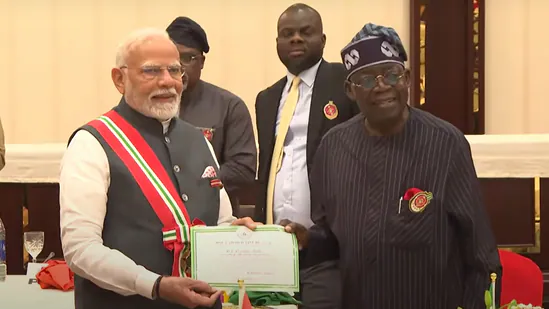
- Strategic Partnerships: India and Nigeria strengthened ties through MoUs on cultural exchange, customs cooperation, and military collaboration, reflecting mutual economic and security priorities.
- Global South Solidarity: Both nations, as key members of the Global South, aim to combat terrorism and promote maritime security while advancing shared geopolitical interests.
- China Counterbalance: India’s engagement with Nigeria emphasizes mutual growth and counters China’s influence in Africa, fostering equitable partnerships while enhancing economic ties.
Indian Prime Minister Narendra Modi became the first Indian Prime Minister in 17 years to visit Nigeria, an oil-rich coastal African country. The visit aimed to bolster the bilateral relationship between India and Nigeria. Both countries are considered important pillars of the rising and emerging economies, and this shared status has fostered a sense of mutual understanding.
This understanding was evident when Prime Minister Modi extended a special invitation to Nigerian President Bola Ahmed Tinubu to attend the G20 Summit in India in September 2023, despite Nigeria not being a G20 member. During the visit, three Memoranda of Understanding (MoUs) were signed, focusing on cultural exchange, customs cooperation, and survey collaboration. Both nations also agreed to advance their existing bilateral military and strategic relationships, emphasizing defense, technology, science, and pharmaceuticals.
Nigerian President Bola Ahmed Tinubu extended his visit to India even after the G20 Summit, beginning his annual state visit a day later. This highlights the strong commonalities between the two countries. This was further emphasized as India’s PM Modi was honored with the ‘Grand Commander of the Order of the Niger,‘ the second-highest award in Nigeria. Prime Minister Modi’s visit to Nigeria is seen as a reciprocal gesture, recognizing shared challenges such as combating terrorism and seeking investments to bolster their economies. Additionally, both countries share a sense of solidarity as part of the Global South.
India’s visit to Nigeria, led by Prime Minister Modi, is strategically significant due to Nigeria’s geographical location, sharing a maritime boundary with the Atlantic Ocean. As a country undergoing economic transition, greater Indian investment can foster a stronger economic relationship between the two nations.
Another key aspect strengthening ties between India and Nigeria is their shared struggle against terrorism. Nigeria has been severely affected by the terrorist group Boko Haram, which has caused widespread devastation and led many youth towards extremism. Similarly, India has been vocal against terrorism, particularly state-sponsored terrorism from countries like Pakistan. This shared commitment to combating terrorism creates a solid foundation for collaboration. Both countries also share a strong commitment to maritime security. With increasing terrorist and piracy activities in the Indian Ocean and along Nigeria’s coasts, cooperation in this area is crucial for ensuring regional stability.
A third significant factor is their shared identity as members of the Global South. Nigeria aspires to greater geopolitical and geoeconomic recognition, aligning with India’s position as the de facto voice of the Global South. Strengthening relations between the two countries allows them to collectively address common concerns and advocate for the interests of the Global South on the international stage.
India’s Importance to Nigeria vis-à-vis China
India’s relationship with Nigeria is significant, especially in the context of China’s growing influence in African countries. China has recently emerged as one of the biggest economic partners for African nations, posing a potential challenge to India’s ambitions in the region. India has long sought to counter China’s expanding presence in Africa, given the continent’s vast natural resources and strategic importance. To compete effectively, India needs to focus on building stronger, more humane relationships with African countries, emphasizing mutual growth and development.
A key difference between India’s and China’s approaches lies in perception. China’s involvement in Africa is often seen as an alternative to Western influence, which gives India a unique advantage. India can position itself as a partner to Africa, not to replace anyone but to foster balanced and equitable relationships. This narrative could help India distinguish its intentions from China’s, enabling it to build deeper ties with African nations while countering Chinese influence in the region.
Aayush Pal is a freelance writer on contemporary geopolitical developments. The views expressed in his work are entirely his own.
